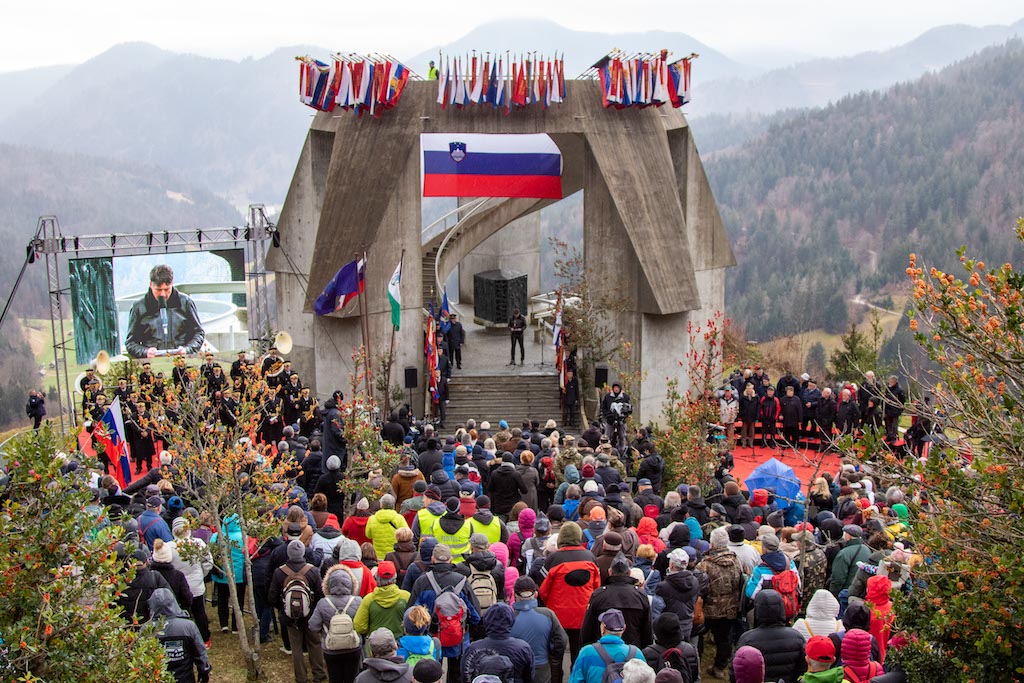By: Sara Kovač / Nova24tv
“Dražgoše is a symbol of rebellion, resistance, tragedy and loyalty to the motherland,” Borut Sajovic, a former member of the LDS party and head of the Gibanje Svoboda parliamentary group, who acted as keynote speaker pointed out at this time’s pilgrimage to Dražgoše in front of the believers of the cult of the great victory, which in reality was a shameful defeat and flight. According to him, when the existence of a nation is threatened, resistance by all means is necessary. “Without rebellion and resistance, we would be speaking German here today,” he said. Historian Dr Stane Granda rejected the latter claim and called it foolish.
“No, no. That is foolish. Here, the assumption is that because of the partisan movement, the Germans would be defeated, and World War II would be over. This is just to be laughed at,” the historian Dr Stane Granda commented on the statement of MP Borut Sajovic, otherwise the former mayor of the Municipality of Tržič
Partisan provocations led to tragedy
Regarding the tragedy in Dražgoše, Sajovic said that it was a courageous resistance of the weak, which was to instil new hope in the fight for freedom, both in Slovenia and throughout Europe. The provocations of the partisans, the shameful escape, and the murdered civilians in Dražgoše are celebrated year after year as a heroic victory of the partisans over the German occupier. In truth, it was a tragedy. Let’s remember. Before the war, about 400 inhabitants lived in Dražgoše, only five of whom belonged to a secret communist circle. In 1941, they invited the partisans to spend the winter in Dražgoše. The majority of the rest of the population was not impressed by the “thugs with weapons” and asked them to leave their peaceful village, as they were afraid of the German reaction to the fact that the Cankar’s battalion was wintering there. The Germans found out about the partisans who were wintering in Dražgoše, and the partisans decided to “defend” the village from the Germans, who came there solely because of them.
Already on the first day of shelling of the village, most of the partisans fled to Jelovica, leaving the civilian population at the mercy of the German occupiers. If the partisans had withdrawn from Dražgoše in time, without steadily worsening the situation in the meantime, such losses would not have been suffered as a result of partisan toying. The Germans killed 41 inhabitants, and 80 of them were transported to Ljubljana. Eight partisans and 27 Germans fell in the battle. Meanwhile, party propaganda diligently increased the number of fallen German soldiers until the number rose to several hundreds. After the battle, Dražgoše was razed to the ground, all the houses, including the village church, were mined, and demolished to the ground. Even after the war, things did not get any better for the people of Dražgose. All that communist Yugoslavia did was a contribution in the form of six barracks. The people of Dražgose were forced to rebuild the entire village themselves.
The President of the National Assembly of the Republic of Slovenia Urška Klakočar Zupančič, Minister of Culture and Labour Asta Vrečko, and Luka Mesec could be seen on this pilgrimage. The former president Milan Kučan was also present, as well as the current president of the country, Nataša Pirc Musar, who also laid a wreath at the monument to the fallen partisans and the murdered people of Dražgoše.
The statements of left-wing defenders of NOB are not serious
According to the historian Granda, the mentioned thought that without the partisan struggle we would speak German in Slovenia, was spread by the Union of Fighters. “Milan Gorjanc talks the same nonsense, namely that we would be speaking Italian today if there were no partisans in Slovenia. This is only to be laughed at in the sense that they still speak German in Austria today, because they did not have partisans”. Granda believes that it is significant that they chose such a low-ranking speaker.
Perhaps, according to Granda’s belief, one day there will be a change in the spirit of Dražgoše and the massacre of the locals will begin to be prioritised, and the culprits for the massacre of the villagers will begin to be discussed, instead of talking about a glorious victory that never happened. The tragedy of the local population was caused by the military’s partisan error of accepting frontal combat, which no guerrilla unit ever accepts.

